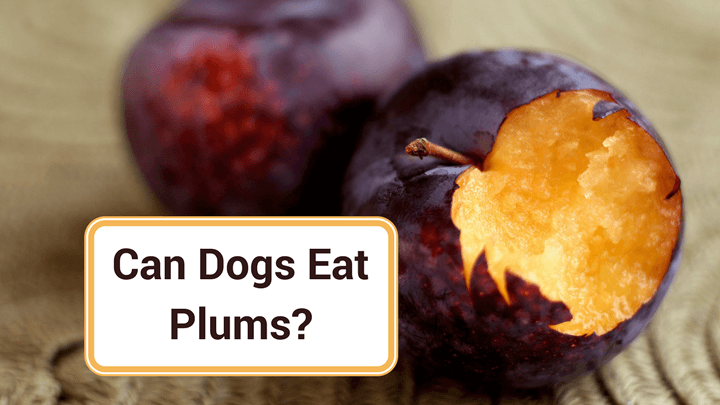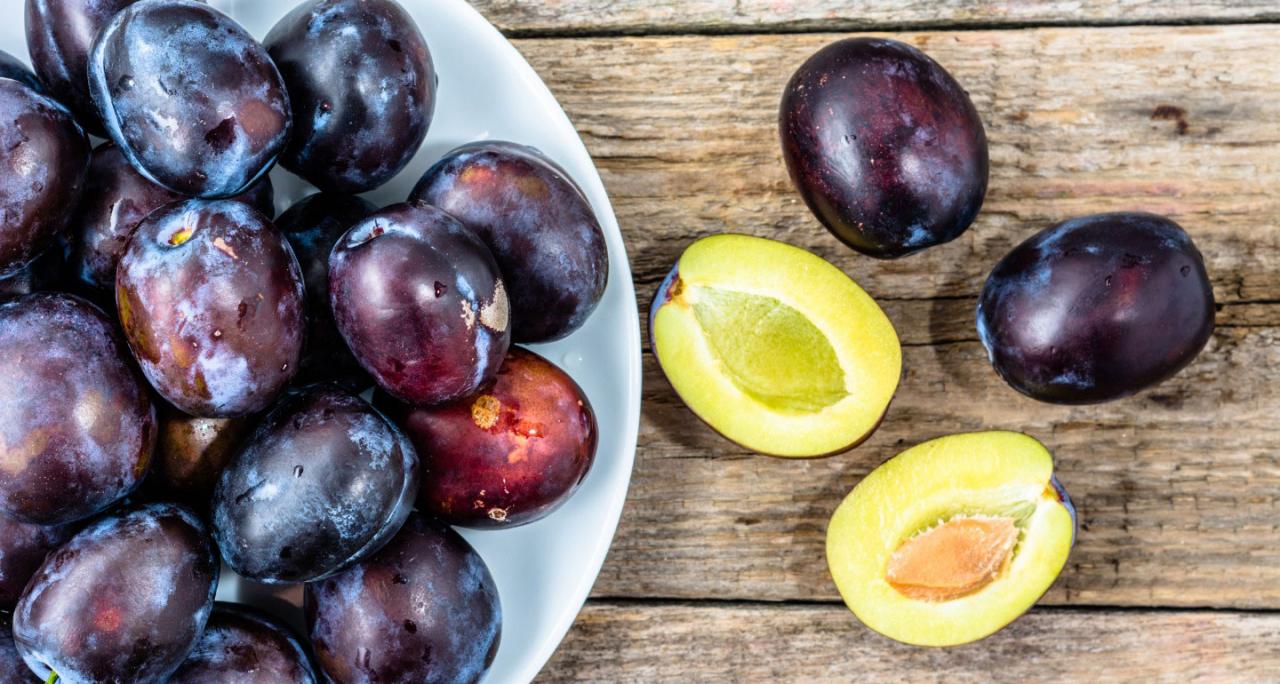Dogs are very social animals, and they try their best to get social with humans. Being a pet parent, it is your responsibility to get attached to your devoted pup. This relationship flourishes most when they share human food with their owner. The more we get involved with our Fido’s, the more they love and care for us.
Dogs love to eat fruits, but all types of fruits are not healthy for them. Fruits help to supplement your dog’s diet. There are various fruits like apple, mango, blueberries, and banana that are nutritious for dogs and safe. Grapes and avocado are the fruits bad for your pup, but what about plums?
Are plums safe for dogs?
Are there any potential dangers of eating plums for your dog?
Well, the answer is not in a simple “YES” or “NO.” Plum is edible for your pet dog, but there are some warning situations too. It is suitable for your pooch to have plum flesh. Still, the plum pit is toxic because it encloses “Amygdalin” and “Cyanogenic glycosides,” causing cyanide poisoning the dogs.
So, you have to be more alert and aware of giving plums to your dog.
NOTE: Dogs are designed to get their core nutrition from fat and protein, and they can handle sugar safely in a small quantity.
Understand about Plum:
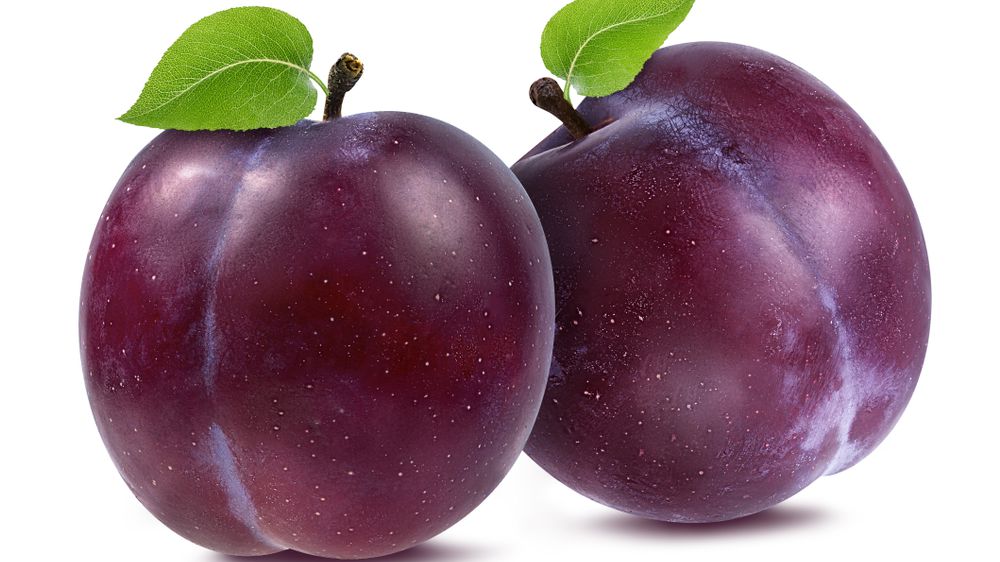
Plum is the close relative of the nectarine, almond, and peach family that belongs to the Prunus genus. These fruits have a seed. That is why it is known as drupe fruit because of having origins surrounded by a hard pit or stone. Plum is a fruit that bursts with flavors and also has nutritional benefits.
Benefits of plums for dogs:
Dogs are omnivores, but meat is their central diet portion. Every fruit and veggies have their health benefits, and similar is the situation with the plum. Fresh fruits are always the source of vitamins and minerals, and it is still good to add some fruits to the pet’s diet plan. Dogs can get many benefits from plums, such as:
- Plums have a relatively good quantity of Vitamin A that is essential for dogs to keep them healthy. Vitamin A is necessary to improve your dog’s nerves, eyesight, muscles, skin, and coat.
- Plum has Vitamin C that is beneficial to enhance your pet’s immune system and fight germs.
- Vitamin K present in plums improves blood clotting and is profitable for the liver of your pooch.
- Copper present in plum is useful for the skin and bone health of your dog.
- Plum is rich in potassium that helps in the development of muscles and makes them strong. In addition to, potassium regulates the enzymes to improve the nervous system.
- Plum has dietary fiber that improves the bowel movement of your Fido. The fiber content in plums also helps to recover from diarrhea conditions for the dog.
- Plums are more than 80% of the water that makes a quick, tasty way to make your dog feel fresh and hydrated.
- High dose of fiber present in plums levels your dog’s blood sugar and promotes insulin sensitivity.
Why can dogs not eat plums?
A few slices of plums are not an issue for your dog, but there are two reasons for them not to eat plums:
Sugar content in plums:
Sugar is a significant concern for your furry canine friend. Plums have high sugar content, and this overloaded sugar can be potentially fatal for our dogs, especially for small dogs. Taking too much sugar for an extended period can create troubles in insulin production and potentially lead to diabetes.
The pit in plum:
The pit, branches, and leaves of the plum tree have a low cyanogenic glycoside level (cyanide). Especially if a smaller dog crushes the pit and digests it, this can potentially poison it. The cyanide level in the plum pit is not so high to cause life-threatening issues, but it can make your furry friend severely sick.
It is not about the toxicity only, but the plum pit can get stuck in the throat or digestive tract of your dog and cause them to choke. The sharp edges of plum pits can also cut your dog’s mouth or even throat and may also perforate its digestive tract.
Overripe plums can be moldy, and sometimes the toxins from the pit can be transferred into the flesh of the plum.
Plum poisoning:
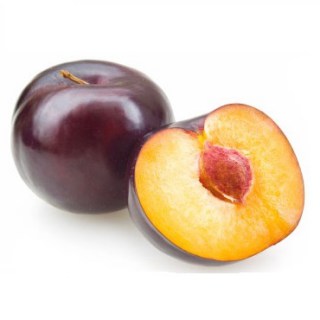
Plum fruit contains one large seed. This seed has a variety of toxins prunasin, hydrogen cyanide, cyanogens, and amygdalin. Hydrogen cyanide is highly toxic to dogs if eaten. Suppose the pit or stone is swallowed whole. In that case, it gets dissolved in the intestinal tract acid and releases toxins in the bloodstream, and spreads the poison through the entire body of your dog.
The plum tree’s roots and foliage also have a substantial amount of these toxins that cause respiratory distress and gastric irritation if eaten. All these toxins present in the roots and foliage slow the oxidative process as a non-competitive inhibitor for an enzyme present in mitochondria. This situation causes respiratory arrest by destroying the blood cells of your pup. This entire phenomenon in which there is plenty of oxygen present in the blood cells, but cells don’t know how to use it is termed as “Plum Poisoning” in dogs. This situation may appear in the form of respiratory collapse and death.
Symptoms of plum poisoning in dogs:
The most common symptoms of plum poisoning in your pooch are:
- Seizures
- Tremors
- Difficulty in breathing
- Panting heavily
- Agitation
- Foaming at the mouth and collapse
- Dizziness, fainting, confusion, and shock
- Reddened mouth, tongue, and gums
- Death in case of receiving no treatment
Treatment of plum poisoning in dogs:
For the treatment of plum poisoning, the priority is to get the cyanide and other toxins out of the digestive system of your pet dog. Otherwise, the liver may become overloaded with toxins, and seizures can damage the brain.
How to clean the plum for dogs?
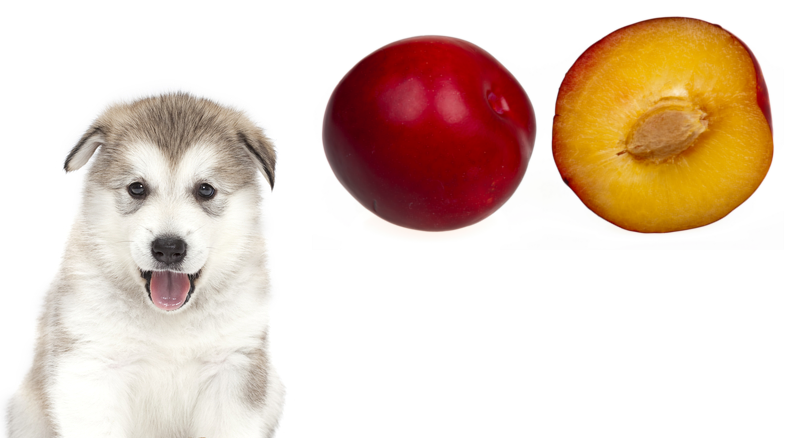
Before serving plum to your dog, you need to clean it properly in the following ways:
- Wash the plums thoroughly as it is essential to protect your canine friend’s health from pesticides and other dangerous chemicals. Wash it with clean water, and there is no need to use any cleaning products.
- Cut the plum into two pieces to remove its pit. If you have large plums, you can make four slices of it.
- You can chop the plum and garnish them on the dog’s meal to make it attractive, and your dog will love you more than ever.
Dried plums for dogs:
Dried plums are also edible for pet dogs with many health benefits. The dried plums and prunes are beneficial to provide constipation relief (they can remove constipation more efficiently than the juicy plums) to your pup and also have anti-cancer properties. They can also be used to add extra flavor to the dog’s food.
Dried plums and prunes have very high fiber concentrations that can cause diarrhea. They are too sweet, very sugary, and sticky enough that can easily stick your dog’s teeth and can be painful to him. In the long term, they can cause dental problems and tooth decay.
Plum servings for dogs:
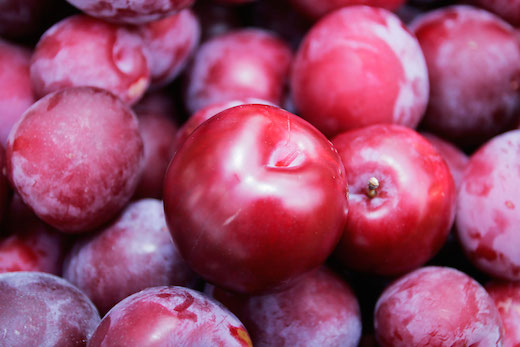
Suppose your dog eats a plum or two. In that case, there is no reason to get worried about it, but make sure the pit is not stuck in the throat of your dog and also keenly observe them for any visible discomfort. Plums can be an occasional healthy treat for your dog, and you can serve them two to three fresh and juicy plums to the pooch occasionally. Plum complements your canine’s regular chow when you add it with other food.
NOTE: Remember! Animals can not typically handle fruits as well as people do. The only tip is to feed controlled amounts. The experts avoid prunes from your pooch’s diet and only give fresh plums after deseeding them.
Conclusion:
Now, the final verdict is that, yes, dogs can eat plums, but with proper precautions. It is a fact that the dog’s digestive system is not like ours, so carefully serve them fruits and veggies with monitoring any allergies or other visible symptoms.
It is good to add plums to your pet’s diet plan. Plums have minerals like copper and potassium, Vitamin C, and K that are beneficial to improve the immune system, liver functioning, improve blood clotting, etc. It is also helpful for treating vomiting and diarrhea.
Pit of the plum is toxic that contains cyanide, and its ingestion or chewing it engulfs wholly can cause intestinal blockage, intestinal swell. In extreme conditions, it leads to death. It is beneficial to train your dog not to eat fallen fruits and serve the plum to your dog moderately with proper monitoring for any symptoms.
The fresh plums in a small amount for your dog on occasions are great. They are made of water mostly (about 80%) and can help hydrate your dog on hot summer days.
